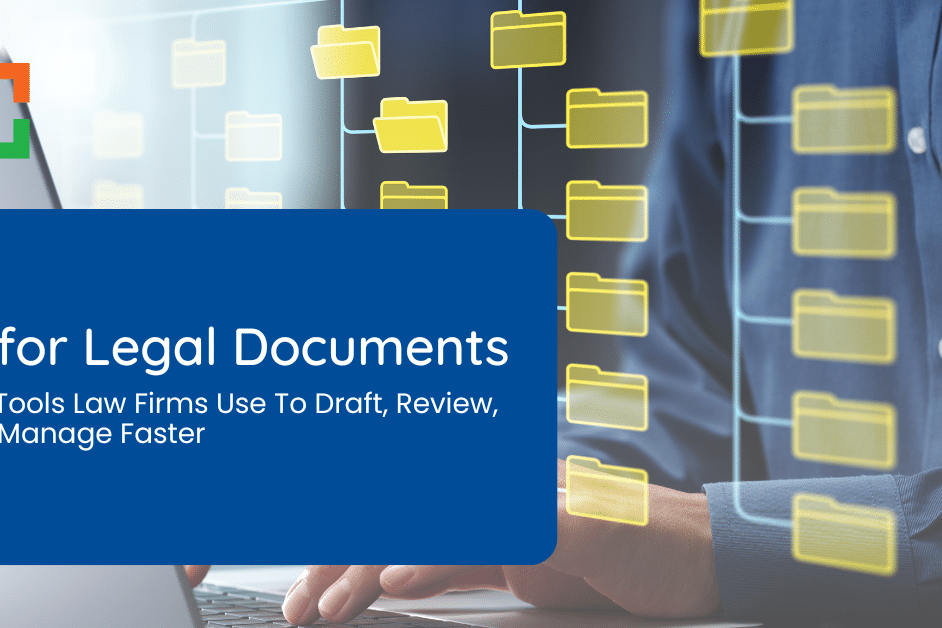What Poor Document Management Is Costing Your Law Firm
 How much money is your law firm losing because of a messy document system?
How much money is your law firm losing because of a messy document system?
You might not see it, but the costs are stacking up — lost billable hours, costly compliance mistakes, and even security breaches that could wreck your firm’s reputation. Every wasted minute — searching for files, fixing version errors, or scrambling for records — drains your firm’s revenue.
And here’s the worst part: you probably don’t even realize how bad it is.
In this article, you’ll learn:
- How document chaos silently drains your firm’s profits.
- The real risks of compliance failures and security breaches.
- How to identify inefficiencies and take control with a modern DMS.
If your document management is a mess, you’re already behind. Let’s fix it.
In This Article
The True Cost of Document Mismanagement
Every lawyer has wasted time searching for a missing document — scrolling through emails, sifting through folders, or asking, ‘Does anyone have the latest version?’ It’s frustrating — and expensive.
Firms bleed time every day on document chaos, and most don’t even realize how much money is slipping through the cracks.
For The Law Offices of Ronald S. Canter, LLC, an outdated file server made it impossible to work efficiently. Files were hard to organize, remote access was a headache, and the whole system felt outdated.
Ron Canter knew something had to change:
“At that time, both our accounting system and our document storage systems were out of date. I needed something different that was reliable and easy to use.”
He’s not alone. Law firms everywhere waste thousands of dollars a month fighting against their own document systems.
Related – AI and Lawyers: Learn what every lawyer should know about the rise of AI in the legal industry.
Lost Billable Hours = Lost Revenue
If you’re spending time hunting for documents instead of practicing law, you’re leaving money on the table. It’s that simple.
Every misplaced file, every versioning mistake, every email chain full of attachments adds up. And when your firm bills by the hour, that lost time means lost revenue.
Let’s do the math:
- If an attorney bills $350 per hour and wastes five hours a week on document issues, that’s $91,000 in lost revenue per year — per lawyer.
- If you have a five-attorney firm, you’re looking at nearly half a million dollars wasted annually.
Ron Canter’s firm felt the same pain:
“I needed a system that was reliable and user-friendly. And possibly more importantly, we needed a company that provided fast and effective support.”
But it’s not just about the hours lost — it’s about the work that never happens. Less time billing means fewer cases taken, slower client service, and a harder time growing the firm.
With LexWorkplace’s version control, your team can avoid those “lost edits” headaches and always have access to the most accurate, updated document.
Administrative Burdens on Attorneys & Staff
Lawyers aren’t the only ones paying the price for bad document management. Paralegals, assistants, and legal administrators waste hours every week dealing with outdated storage systems, misplaced files, and versioning nightmares.
Without a real DMS, firms rely on a broken system:
- Files saved in random local folders.
- Documents sent back and forth via email attachments (a nightmare).
- Staff manually renaming and organizing files because there’s no automation.
Sound familiar? It’s exhausting, inefficient, and completely avoidable.
Bad document management makes work harder than it needs to be. Fixing it isn’t just about saving time — it’s about making everyone’s job easier, reducing stress, and actually letting lawyers focus on lawyering.
Bring AI to Your Legal Documents
LexWorkplace Includes:
- Interactive Document Conversations: Engage in a ChatGPT-like dialogue with LexWorkplace AI to discuss document contents and related subjects.
- Contextual Query Suggestions: Receive automatic, context-specific question prompts about any document, helping you delve deeper into its details.
- Seamless Integration and Saving: Click the AI icon to start discussions and easily save conversations as Matter Notes within LexWorkplace.
The Hidden Legal and Financial Dangers of Poor Document Management
Mishandling document is a serious risk to your firm’s reputation, bottom line, and legal standing. Poor document management makes compliance harder, increases the likelihood of fines, and exposes sensitive client data to hackers.
Law firms deal with some of the most confidential information in any industry, which makes them a prime target for both regulators and cybercriminals.
Compliance Failures: The Silent Threat That Can Cost You Millions
Law firms operate under strict data security, retention, and ethical regulations, and failing to meet these standards can lead to malpractice claims, disciplinary actions, and financial penalties.
Many firms believe that having policies in place is enough — but if documents are hard to track, improperly stored, or insecurely shared, your firm is already at risk.
- Simpson Thacher & Bartlett is currently under investigation in the UK for anti-money laundering failures, a compliance breakdown that could have been avoided with better document control.
- A major defense contractor recently paid $950 million in legal penalties due to compliance failures, proving how expensive regulatory missteps can be—even for firms that think they’re covered.
For law firms, the risks go beyond fines. Disorganized documents don’t just slow you down — they put your firm at risk of fines, malpractice claims, and ethics violations.
Related – Best Legal Document Management Software: Learn about the industry’s top legal document management software.
Law Firms Are Now Cybercrime’s Favorite Target
Hackers know law firms are goldmines of confidential data — financial records, trade secrets, privileged communications. That’s why cyberattacks against law firms are increasing every year, with data breach lawsuits skyrocketing from 33 per month in 2023 to over 40 per month in 2024.
The average cost of a law firm data breach hit $4.88 million in 2024, a 10% increase from the previous year. This includes legal fees, regulatory fines, lost clients, and reputational damage.
When firms rely on email chains, shared drives, and outdated storage systems, they create gaps in security that hackers easily exploit. Poorly protected files make it easier for cybercriminals to steal confidential client data, and once that information is leaked, there’s no undoing the damage.
The Fix: A Document Management System That Protects Your Firm
Ronald Canter saw these risks firsthand when his firm struggled with an outdated file system:
“LexWorkplace is very user-friendly and permits the easy sharing, downloading, and transferring of documents.”
A modern Document Management System (DMS) doesn’t just improve efficiency—it locks down sensitive information, ensures compliance, and prevents security breaches before they happen.
Without one, firms aren’t just dealing with inefficiencies. They’re leaving themselves exposed to regulatory penalties, malpractice claims, and devastating cyberattacks.
How a Modern DMS Transforms Law Firm Operations
A modern DMS eliminates inefficiencies, keeps attorneys focused on billable work, and strengthens security. Here’s how.
- Automated Organization – Metadata tagging and quick search tools help retrieve files in seconds, eliminating time wasted digging through folders.
- Version Control – Prevents accidental overwrites and ensures everyone is working from the latest draft.
- Cloud-Based Access – Attorneys can securely retrieve and share documents from anywhere, reducing confusion and improving collaboration.
- Secure File Sharing – Eliminates risky email attachments and ensures compliance with client confidentiality standards.
- Built-in Security & Compliance – Legal-specific safeguards like bank-grade encryption, granular access controls, and audit trails protect sensitive data.
- Automated Organization – Metadata tagging and quick search tools help retrieve files in seconds, eliminating time wasted digging through folders.
- Version Control – Prevents accidental overwrites and ensures everyone is working from the latest draft.
- Cloud-Based Access – Attorneys can securely retrieve and share documents from anywhere, reducing confusion and improving collaboration.
- Secure File Sharing – Eliminates risky email attachments and ensures compliance with client confidentiality standards.
- Built-in Security & Compliance – Legal-specific safeguards like bank-grade encryption, granular access controls, and audit trails protect sensitive data.
Next Steps: Evaluating Your Firm’s Document Management Needs
If your current document system is costing your firm time, revenue, and security, it’s time to take action. Small inefficiencies quickly turn into missed deadlines, compliance headaches, and lost billable hours.
Want to see how a modern DMS can fix these issues? Try LexWorkplace for free today.
Is Your Law Firm’s Document System Slowing You Down? Here’s How to Tell
Every legal matter depends on having the right documents in the right hands at the right time. But too often, law firms are bogged down by disorganized storage, outdated systems, and wasted hours spent tracking down files.
Small inefficiencies snowball into missed deadlines, compliance headaches, and lost billable hours. If document management feels like an uphill battle, it’s time to identify the weak points before they cost your firm even more.
1
Your Team Wastes Too Much Time Searching for Documents
Every attorney has been there — scrolling through folders, digging through email chains, or asking colleagues, “Does anyone have the latest version of this?” When documents aren’t stored in a centralized, well-organized system, time is wasted, frustration builds, and deadlines become harder to meet.
- Attorneys and staff spend 20+ minutes looking for case files that should be accessible in seconds.
- Paralegals and assistants constantly ask where a document is stored because there’s no consistent filing system.
- Important records get mislabeled or misplaced, leading to duplicated work and wasted effort.
- Case deadlines become stressful — not because of the legal work, but because tracking down documents is a challenge.
If your team spends more time searching for files than practicing law, your firm is operating at a major disadvantage.
2
Version Control Issues Are Causing Costly Mistakes
Without clear version control, multiple people can work on different drafts, leading to errors, confusion, and inefficiencies.
- Two attorneys walk into a client meeting with different versions of the same contract.
- Someone accidentally saves over a key document, with no way to recover the previous draft.
- Email chains are filled with attachments labeled “Final_FINAL_v3.doc,” making it impossible to know which one is correct.
- Finding the most up-to-date version of a court filing turns into a 30-minute back-and-forth.
When versioning is left to chance, firms risk sending incorrect documents to clients, filing outdated briefs, and losing important edits.
3
Security & Compliance Gaps Are Keeping You Up at Night
Law firms handle sensitive client data, making compliance failures and cybersecurity risks a constant concern. If your firm doesn’t have a secure, structured system for managing confidential files, you’re one audit — or breach — away from serious trouble.
- Responding to compliance audits is a nightmare because files aren’t well-organized or easy to retrieve.
- Privileged client data is stored on personal devices, emailed as unsecured attachments, or left in unprotected cloud folders.
- Your firm’s document retention policies are unclear or inconsistent, increasing legal and ethical risks.
- When attorneys leave the firm, there’s no standardized process for securing or transferring the files they had on their devices.
Regulatory fines, ethics violations, and data breaches aren’t just hypotheticals — they’re costly realities. A modern DMS ensures your firm stays compliant, secures sensitive information, and protects your reputation.
Looking for Document Management Software?
LexWorkplace:
Modern Document Management for Law Firms
LexWorkplace is document & email management software, born in the cloud and built for law firms. Here’s a quick primer on how it works, or get your free trial to discover LexWorkplace for yourself.
Organize by Client & Matter
Organize documents, email and notes by client or matter. Store and manage all data for a case or project in one place.
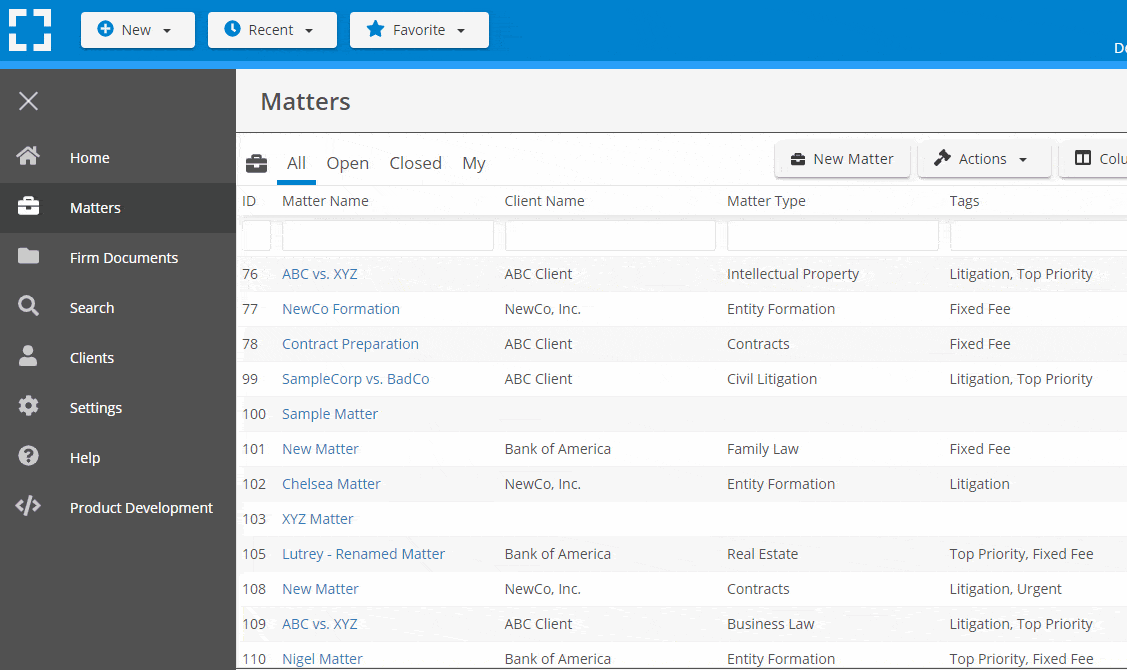
Go Beyond Basic Files & Folders
Supercharge your firm’s productivity with true DMS functions.
- Version Management
- Document Tagging & Profiling
- Document Check-Out / Check-In
- Microsoft Office Integration
- Automatic, Integrated OCR
- Convert Word Docs to PDF
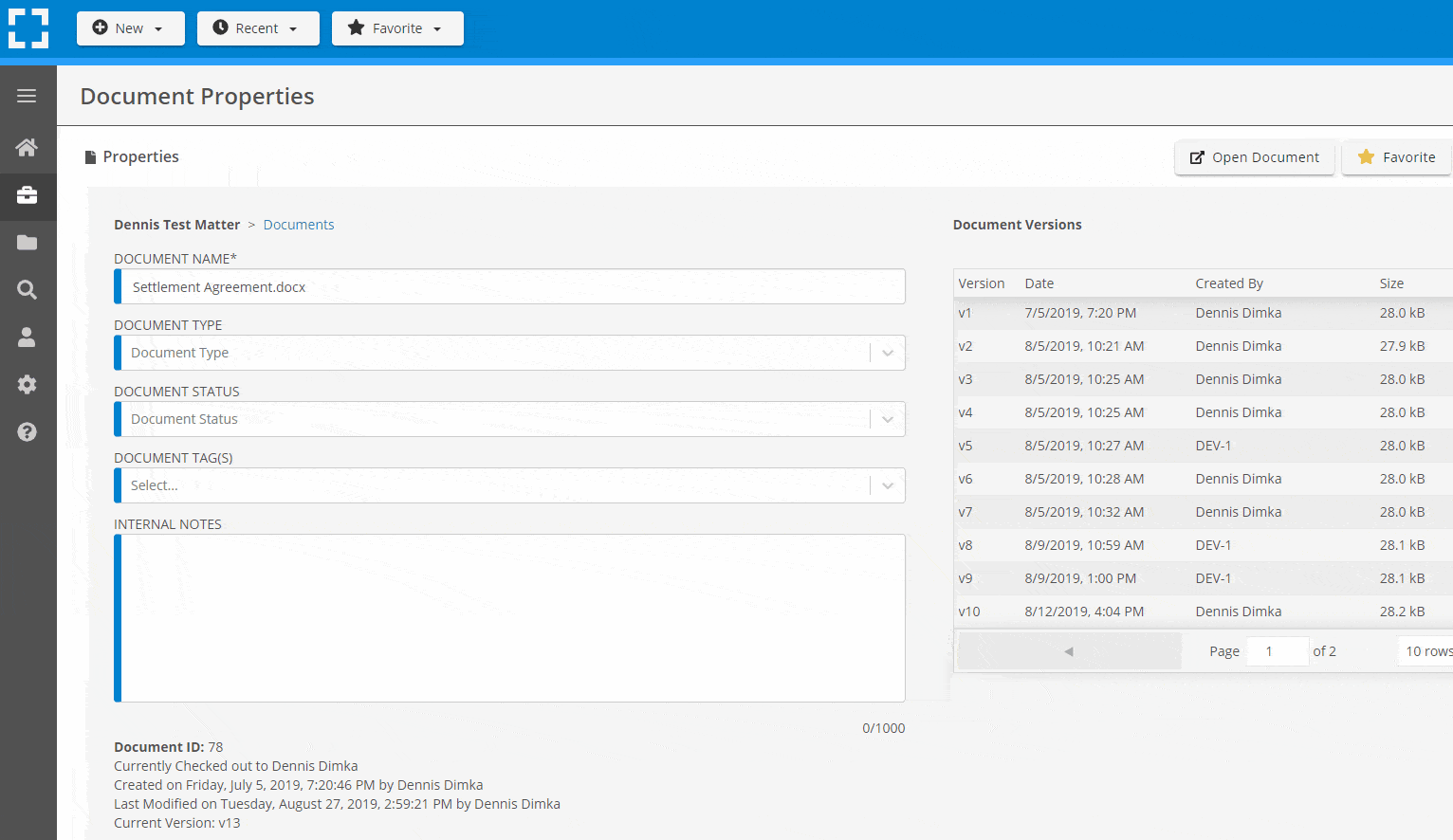
Search Everything
LexWorkplace is like Google for your law firm. Search across millions of pages, documents, folder email and notes in seconds. Refine your search by matter, document type, author and more.
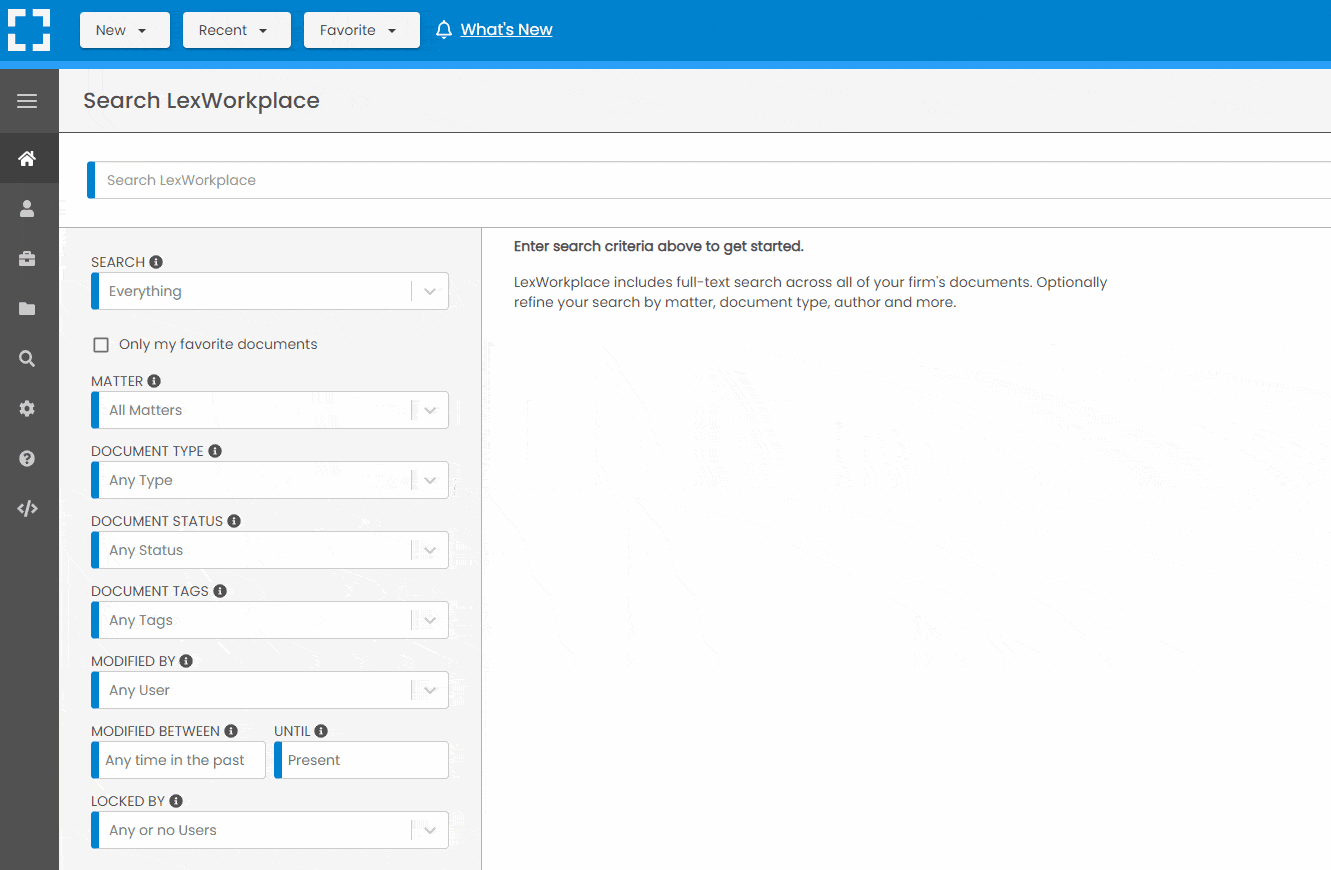
Search by…
- Client or Matter
- Document Type (Contract, Complaint, Order, etc.)
- Document Status (Draft, Final, etc.)
- Document Tags (Filed With Court, Fully Executed, etc.)
Outlook Integration + Comprehensive Email Management
Save emails to a matter without leaving Outlook. Saved emails are accessible to your entire team, organized and searchable.
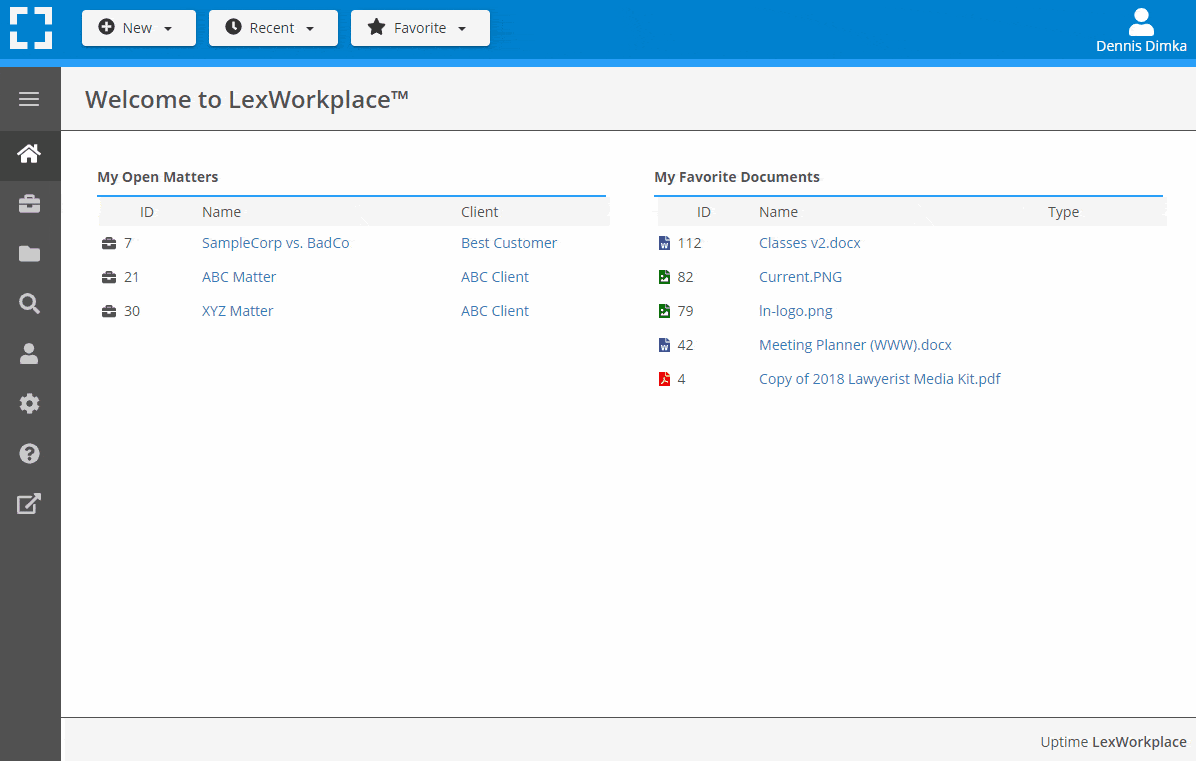
- Outlook Add-In that Works With Windows and Macs
- Save Entire, Original Email to a Matter in a LexWorkplace
- Email De-Duplication
- Organize Emails into Folders, Subfolders
Works with Windows and Macs
All of LexWorkplace is compatible with both Windows and Mac computers.
Next Steps
See What Clients Have to Say
Lawyers love LexWorkplace. See how the system streamlined one lawyer’s practice.
Watch the 5-Minute Demo
See LexWorkplace in action in our quick 5-minute overview and demonstration.
Or, if you want a one-on-one demo, or want to talk about LexWorkplace for your firm, schedule a call or demo below.
You Might Also Like
August 19, 2025
AI for Legal Documents: Top Tools Law Firms Use To Draft, Review, and Manage Faster
Struggling with slow legal document…
August 12, 2025
Why Law Firms Can’t Afford to Delay DMS Migration — And How to Switch Smoothly
Tired of costly, stressful tech…
June 23, 2025
Role-Specific Benefits of Document Management Software for Law Firms
Legal document management software…
Want More Legal Technology Tips?
Subscribe to Uptime Legal to get the latest legal tech tips and trends, delivered to your inbox weekly.


